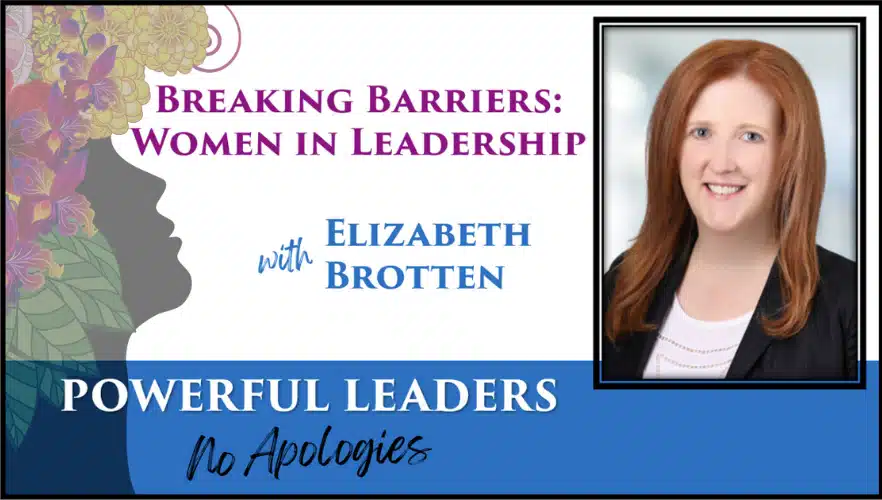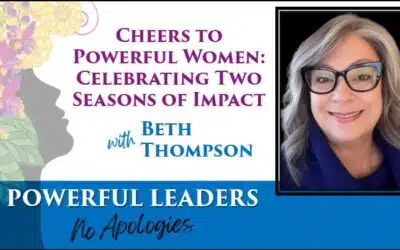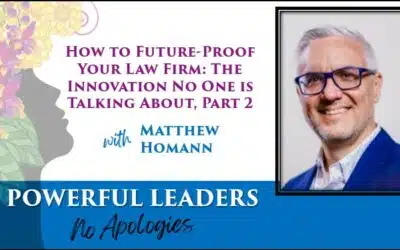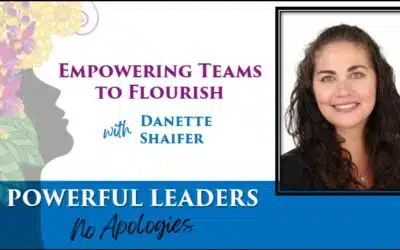Debbie Foster (00:03):
Welcome to the Powerful Leaders. No Apologies podcast, a show about women who are ready to own their power and change the world. My name is Debbie Foster.
Beth Thompson (00:12):
And I’m Beth Thompson. Our guests are fierce and fabulous women who are making a difference in their personal and professional communities. Are you ready to be inspired? If so, stay tuned and also check out our website at affinityconsulting.com slash powerful leaders. Here’s the show. Hi, Debbie.
Debbie Foster (00:35):
Hi Beth. How are you?
Beth Thompson (00:37):
I’m good. We get to record together twice in one week. We don’t normally do that. Well, we have done it, but it’s nice.
Debbie Foster (00:44):
But I don’t think we’ve ever done twice in one week with someone from the same city or state.
Beth Thompson (00:49):
That is true. We are back with mini Minnesotan. Is that how you say it? Yes. Exciting. Exciting today. Perfect segue. Why don’t we go ahead and introduce our guest today, which is Liz Bratton. Welcome to the show.
Elizabeth Brotten (01:04):
Thank you.
Beth Thompson (01:05):
We would love for you to start out by just telling us about your career journey, how you started, and how you got where you are, what you’re doing now.
Elizabeth Brotten (01:13):
Well, sure. Liz Bratton from Minneapolis, Minnesota. I am a Minnesota transplant. I grew up in North Dakota, attended college near the North Dakota, Minnesota border, and then wanted to attend law school and not quite as cold of a state. So I moved to Minnesota and yes, there are colder states than Minnesota, north Dakota’s one. So moved to Minnesota for law school and met my husband during law school. And I say, if you marry a Minnesotan, sorry, but you better be ready that you’re never leaving. So started my career at the Minnesota Court of Appeals where I clerked for a judge for a year. And during that clerkship I was lucky to get a job as an associate at Foley in Mansfield. So started there after I graduated. That’s where I’m at now. But I did take a little detour during my career after about seven years at Foley in Mansfield, I decided that I was at the point in my career where I really needed to develop my trial skills in a way that if I didn’t at that time, I was going to get to a point where it was a little too late to start trying cases for the first time.
(02:27):
So I went to a different firm in Minneapolis that is smaller, more regional, local than Foley in Mansfield, but that, I mean, I could go up and down the hallway and everyone had tried a case within the last year, and that’s really what I was looking for in terms of experience and that kind of mentorship. So went over there, got a lot of trial experience, which was exactly what I was looking for. And then got to a point where really my career was starting to go back to somewhat of the toxic tort practice area. So I started having some success in business development back in the toxic tort area that I had practiced so heavily in at Foley and Mansfield, and decided that I was really at a point where if I wanted to grow that truly into what it could be, I needed to go back to the bigger platform of the bigger national firm that was more well-known for kind of this specific practice area. So headed back to Foley in Mansfield in 2018, and there was also a need at that time for some more senior leadership and partners in the toxic tort department. So I was happy to help with those efforts as well. And got to where I am today, which is I manage our Minneapolis office and I also serve on our executive committee for our firm as a whole.
Debbie Foster (03:46):
That’s a really interesting story. So I just have to say how much colder is North Dakota than Minneapolis, because that didn’t seem like a, I mean, is it a lot colder?
Elizabeth Brotten (03:59):
Yeah, so it’s a lot windier
(04:02):
And yeah, the wind just whips across the prairie there. And I ran track in college, and so I tell this story, we were essentially in North Dakota. I probably ran more miles in North Dakota than Minnesota, but the rule for our track team was that if it was warmer than 30 below, we had to run outside. So although we had an indoor track treadmills and everything, that’s what the standard was. So we might talk about it a little bit later, but I feel like that was kind of the development of my resiliency to be able to tolerate that.
Beth Thompson (04:38):
I might be more impressed by that than anything you’re going to say in the next 25 minutes.
Debbie Foster (04:43):
Wow. I agree. I agree. Beth’s in North Carolina and I’m in Florida, and it was like 54 degrees the other morning and I had to take my dogs out and I thought I was going to freeze to death. It was so cold out there. So yeah, 30 below it was pretty significantly cooler than my freezing cold 54. So Liz, I met you at an A event, I don’t know how many years ago, but it probably was not long after you came back to the firm and you were there with Abby Rooney, who’s another super powerful female leader at Foley Mansfield, and we talked about doing some strategic planning with your firm. So I know your firm pretty well, and I’m going to ask you a question about leadership that I think is a unique perspective as far as the guests we’ve had on our podcast. So the managing partner of Foley in Mansfield is Kyle Mansfield, who is a super dynamic leader, very like when he’s in the room, he is in the room, he is got that presence, and he’s just the superstar. And when you took over managing the Minneapolis office from him, he was managing partner of the firm, but also of the Minneapolis office. You had some big shoes to fill and you had to figure out how to make space for your role as the managing partner of that office. And I’d love for you to talk a little bit about that.
Elizabeth Brotten (06:14):
Yeah, I think there’s kind of two things that went into it. And the first was just being really self-aware of the strengths that Kyle brought to the role and the things that people looked for him for and the strengths that I could bring to the role and the fact that they were very different. I’m not Kyle, I never will be Kyle, but having an understanding of the things I had that I could offer that maybe he couldn’t, one of which was being time, having the time and being more available, then he could be given his role. And just knowing where those differences were and being prepared to handle the situations where people might’ve wanted a Kyle approach to that. And I was going to bring something different and just being kind of aware enough to be prepared for those situations. And the second was just being able to really directly communicate with Kyle about what those challenges were going to be, how we were going to handle them when they come up. What are we going to do when someone goes to him instead of me? How are we going to handle that? What’s going to happen? People are used to him, they’ve maybe handled that situation with him before. What do we do about that and how do we prepare people to the fact that no, those types of situations are now my responsibility to handle. So I think just the self-awareness and keeping the communication lines open helped with that transition quite a bit.
Debbie Foster (07:37):
I think you also had the backing of Kyle, like I saw even when we were meeting, Kyle recognized the value of having the next generation of leaders, not just in the Minneapolis office, but in other offices, next generation of leaders stepping up and really supporting that next generation of leaders and making sure that your voices were really heard. And that’s something that I think there’s probably a lot of people listening to this thinking. Not every founder of a law firm figures out exactly how to do that. And I’m sure there were some bumps along the way, but from my perspective, kind of watching what I watched with all of you, you guys really made some great progress in figuring out how to make sure that your newer leaders have a voice and that Kyle even held space for you all to be in those positions.
Elizabeth Brotten (08:32):
I think that’s right. Yeah. People naturally look to Kyle’s reaction to any situation that happens within the firm, and if they see that he is on board with it, confident with it supports it, there’s not much room at the firm to not get on that bandwagon too.
Beth Thompson (08:48):
We always like to talk about challenges and how we overcome them, and I think this is really one part of the show that our listeners get the most out of because they maybe have experienced the challenge or they have yet to experience the challenge. But I think you’ve actually given two examples of really how you, I think, skirted what could have been potentially two big challenges. One is recognizing from a career trajectory that you needed or wanted to go ahead and get that trial experience. And then when you stepped into Kyle’s shoes, it sounds like you really were prepared and thoughtful about your approach so that you did avoid some of the pitfalls that many would fall into. But can you think of another challenge that you’ve had in your life or in your career that you overcame and how you did that?
Elizabeth Brotten (09:43):
Well, I can talk about maybe one right now that we’re maybe in the middle of, and hopefully in a year I can tell you that we overcame it. So when I stepped into my role in Minneapolis, we had very much of a, this is how things have always been done approach, and the litigation has changed so much. The type of toxic tort litigation that we do. Clients want different things. Our clients and insurers will pay for different things or not that they, it’s just a whole different approach than what was happening 20 years ago when you’d get in hundreds and thousands of claims and they’d be settled and you’d be done. We are now facing trials. We have new and different clients with new and different products that we’re working. We have the opportunity and fortune to work for. And so switching that mindset, helping our staff switch mindsets to thinking, here’s how we did it in the past and that’s great, that worked really, really well.
(10:44):
What should we continue from the past and what new practices should we adopt as we adapt to the future of what our clients need? How can we use tools like ai? How can we better use the technology that we have? How can we retool roles? Where do we have paralegals doing things that aren’t getting paid that we should be switching to our staff? So that’s the kind of challenge. I love figuring out all those puzzle pieces. What should we do the same way? What needs to change and what should we stop doing completely? I kind of put things into three different buckets as I’m going through that, and certainly there’s always a comfort in doing things the way they have been done in the past. And there’s some challenges to helping people see the reasons for change or the reasons some things will stay the same, and it’s been a real fun and at times frustrating of course, but opportunity to just help implement some change for the firm to just make sure we’re staying relevant and providing the same excellent service that we’ve always provided to our clients in the future.
Beth Thompson (11:49):
We’ve heard that often, right? Well, that’s how we’ve always done it. I think the first step which you’ve taken is acknowledging that there’s room for growth and that we can reevaluate where we are and what got you here won’t get you there. We say that often as well. Let’s shift gears a little bit and talk about what’s inspiring you. Are you listening to any podcasts? Have you read any books or reading any books that have inspired you as a leader or as a woman? We’d love to share recommendations with our listeners?
Elizabeth Brotten (12:19):
Yeah, so I am a true crime podcast, so that is not inspiring me at all, which I think is a good thing. There’s certainly leadership books I like and books about legal process that I like, but I’m a kind of person where I like some separation. So when I’m at work, I’m at work and when I’m not, I’m not. So yeah, true crime podcasts. And then when it comes to reading, I am trying to finish a book. I started on holiday vacation called Nightingale, and it is set in World War II Europe and really tells this story of two sisters who are quite different, but it really just shows the resiliency, kind of the human spirit during those turbulent times.
Debbie Foster (13:01):
I just started that book.
Beth Thompson (13:03):
It’s so good. It’s one of my top five books of all time. I finished it I think during the break between the holidays. I love Kristin Hannah. She can do no wrong in my mind. That is absolutely one of my favorite books. So we’re all in good company here.
Elizabeth Brotten (13:19):
Awesome.
Debbie Foster (13:19):
I can’t wait to read it. Liz. I’m wondering, did you have any mentors along the way that you would call out as someone who you were like, I’ve learned a lot of things from this person. Anyone you can think of or any examples about mentors or mentoring?
Elizabeth Brotten (13:35):
I try to take the approach that everyone I meet right there is something I can learn from everyone I meet. So literally everyone I’ve met in my legal career, there’s a piece I’ve taken and learned what to do, maybe what not to do. Maybe I want to handle the situation more like that person did. Maybe I don’t want to handle it how that person did, but for me it’s really been more about taking those pieces from each person I try to encounter, what do they do really well that I could learn from?
Debbie Foster (14:05):
I did an ilta webinar yesterday about mentorship programs and it was about cross-department, I’m sorry, cross-generational mentoring. And we were talking about the value firms often create mentoring programs and they think that we’re going to pick our mentors and our mentors are going to pour into the mentees. And we were challenging that and saying it’s actually a two-way thing. There’s so much that we can learn from people who are less experienced or younger than us and so much that we can learn from people who are more experienced and older than us and also so much we can learn from our peers. So that’s actually a great example and really timely based on that conversation yesterday about really thinking differently about the mentor mentee relationship.
Beth Thompson (14:54):
Well, it’s so interesting timing. I just read that to be released at legal week next week, our mid-market firm priorities report that we’ve done now two years in a row, and there is so much of the generational differences throughout. It’s so fascinating.
Debbie Foster (15:10):
Love it, love it.
Elizabeth Brotten (15:11):
There’s some great research out there too about generational differences in mentorship and work relationships for women and how important that is too. So it’s fascinating
Debbie Foster (15:22):
And it’s one of the reasons why we started this podcast. We were talking about how there’s a lot of stuff that happened for women, and Beth and I have been involved in lots of women focused events with the different associations in legal, but we also have both been in legal for a really long time and we meet these amazing, powerful female leaders and we were like, how do we learn from them? How do they learn from each other? How do we make this content available? And it really is one of the stories about how this podcast was born. So Liz, I want to ask you a question. Speaking of why we created the podcast, one of the things that as we were researching women as leaders, one of the things that was referenced over and over again in articles and books that we read was how women have this tendency to apologize far more frequently than men.
(16:18):
And some of it was around just even basic and simple things like starting off with, I’m sorry, or walking into a room and saying, I’m sorry for interrupting. Just some really surface level starting with, I’m sorry, but some of it was deeper than that. It was about how we think about how the things that we apologize for if we were to put that same exact situation, and not that we’re ever in the man bashing camp here, but something that a man would never feel the need to lead with or at some point in the conversation say, I’m sorry. And I’m wondering if that has been your experience or if you have any thoughts about this idea of women apologizing.
Elizabeth Brotten (17:01):
So I’m going to kind of back up and explain why I think I have this perspective, if that’s all right. Yeah. I have been fortunate. I’ve realized to never have worried that being a woman would hold me back in my career. And I think that’s because I had two great grandmothers who were very much pioneers on their own. Literally they immigrated to the United States from Norway. They homesteaded on the North Dakota prairie by themselves. They built their own homes literally. So I never met them, but I think in things that I saw in my parents, my grandparents that I was able to meet, I saw those kind of things that kind of pioneering. There’s nothing about who I am that can or will hold me back type of spirit. So I think that has always driven how I’ve seen things. So again, I feel fortunate about this, but I’ve never had those types of hesitations or hold me back type of moments in my career entering the legal field.
(18:08):
Certainly I started seeing them and realizing that they were being experienced by others. But I think the thing for me is that you earn opportunities and you should never apologize for taking those opportunities that you’ve earned or been offered whatever they are and taking ’em and running with them. I think women tend to more often than men, there’s the thing of if there’s a job opening and you fit seven of the 10 criteria, men will apply and a woman will be like, well, I don’t fit all the criteria. So I think there’s a thing about feeling that you’re not ready for something and thinking that you should apologize for being offered an opportunity that you don’t feel ready for or worse yet saying no to it. I think those are tendencies that I’ve seen in women and just having the self-awareness of where you stand that if you’ve been offered a great opportunity, even if you don’t feel ready for it, take it and don’t apologize about doing that. You’ve earned it.
Beth Thompson (19:12):
Thank you so much for sharing about your grandmothers. That is fascinating. Would I wish there was a book that would be a very interesting book, right, about their journey here and how they established themselves and then went on to create family. So that’s really interesting.
Debbie Foster (19:29):
I’m sure there was some fear, but it seems like a fearless story. I can do that. And the fact that you said you didn’t know them, but clearly it’s in your blood, that kind of thing is part of what made you who you are. And I too wish there was a book because that would be a great book,
Elizabeth Brotten (19:50):
And I think this is a lesson from Peloton, which I get a lot of as well. But being courageous doesn’t mean you’re not afraid or that there’s no fear. It means that you do it anyway. Right.
Debbie Foster (20:03):
There’s our podcast title right there.
Beth Thompson (20:06):
Yes, I do believe that is it. Thank you. You’ve saved us a little bit of time having to come up with the title.
Debbie Foster (20:13):
Chelsea’s going to appreciate that as well. So Chelsea, there you go. There’s the title. Yes,
Beth Thompson (20:18):
Yes. Perfect. So here we are in our last question and our favorite question, I believe every episode, what is your leadership superpower?
Elizabeth Brotten (20:28):
So I think this goes along with the stories I’ve told about my great-grandmother’s, but I think it’s resiliency, having really hard things happen and being able to come through on the other side. And by that, I do want to acknowledge that there are mental health challenges have, and I don’t mean by any means that those should be ignored or not addressed or whatever when we’re talking about resiliency, but just having those core skills, I think that I’ve been able to develop of knowing that I am capable of doing really hard things. And that might mean asking for support. It might mean asking for help, but just not getting completely derailed when something hard happens. I think I’m able to stay focused on finding a solution however we can get there.
Debbie Foster (21:15):
I love that. That is an excellent leadership superpower. Liz, thank you so much for joining us on the podcast. It has been a pleasure to hear that story, and I cannot wait for my flight to Phoenix tonight where I will likely finish the book and I’ll make sure I email you guys about how amazing It’s, I’m about 25% of the way through and I could barely put it down so
Beth Thompson (21:38):
It just gets better and better. So I can’t wait to hear your thoughts on it. Yes, thank you, Liz. It was nice to meet you. We’d never met before, and thank you for being on our show.
Elizabeth Brotten (21:48):
Thank you so much. Take care.
Beth Thompson (21:52):
And that’s a wrap. Thanks for listening to Powerful Leaders. No apologies. Be sure and subscribe to our show and help us spread the word by sharing our show with your network,
Debbie Foster (22:02):
And check out our show notes@affinityconsulting.com slash powerful leaders for resources and ways to connect with us. See you next time.



